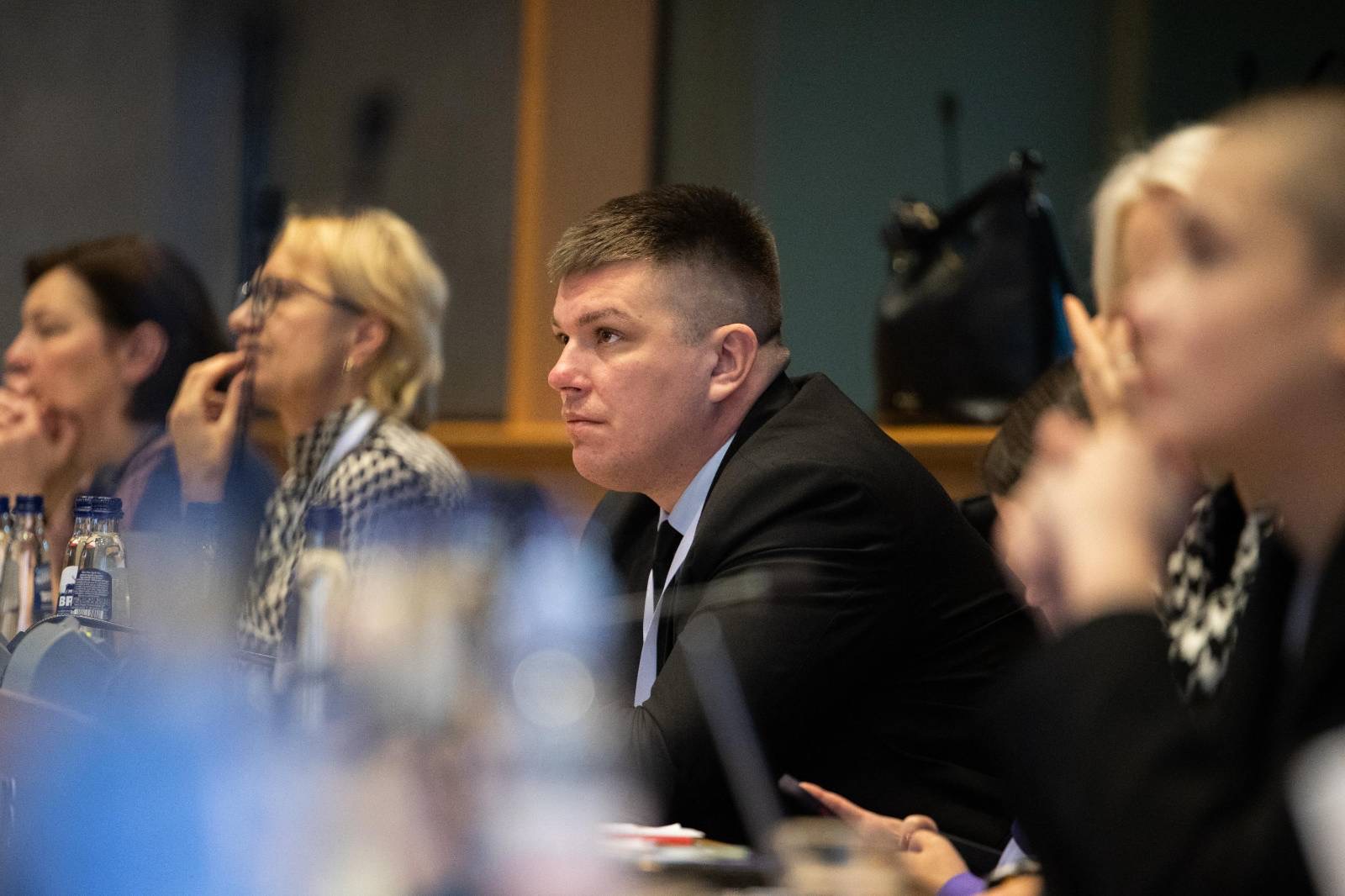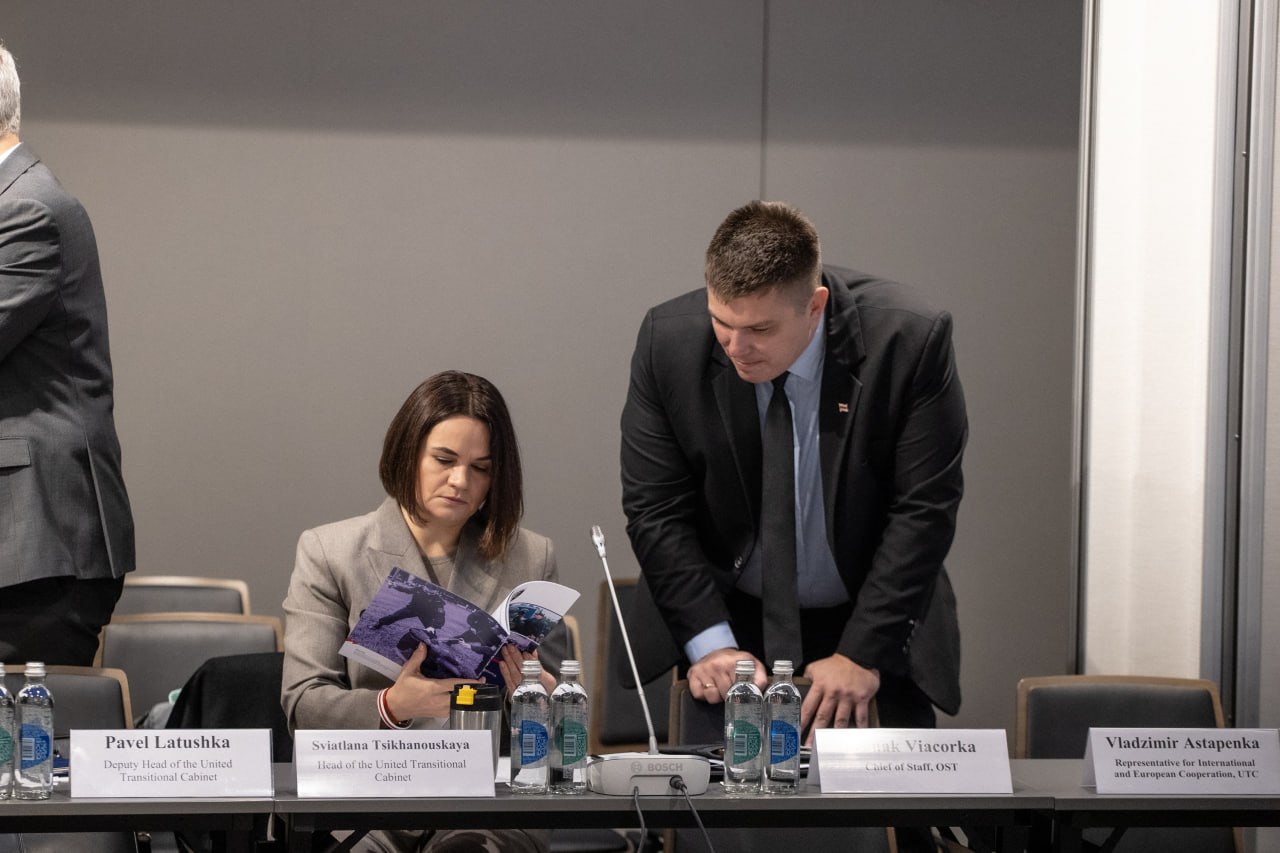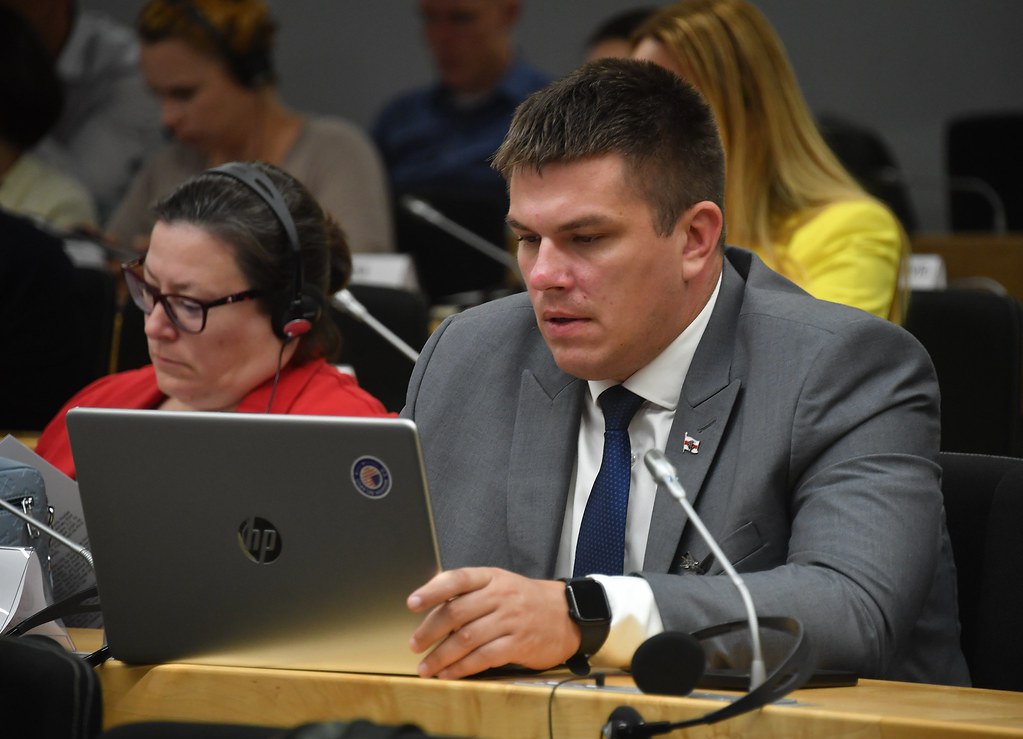
As Alexander Lukashenko’s dictatorship hardened, former Belarusian law enforcement officials decided to put their skills in the service of the opposition and, to that end, they established a group named BELPOL. Vladimir Zhigar, a former criminal investigator working with the BELPOL, gave Veridica some insight about the group’s activities and motivation.
“My superiors ordered me to draw up a false administrative offense report against a blogger”
VERIDICA: Could you tell us what BelPol does?
VLADIMIR ZHIGAR: BELPOL is an analytical and monitoring organization of the Belarusian democratic forces. We collect information from inside Belarus, analyze it, and provide it to our European and overseas partners in order to give them a better understanding of the internal situation. This helps them adjust their activities and find the most effective forms of resistance against the Lukashenko regime.
About 80% of BELPOL’s work is non-public: preparing confidential analytical materials about the situation inside Belarus, holding classified briefings in EU and US institutions, and helping partner countries impose more effective sanctions on the Minsk regime.
These closed briefings for European and American government bodies and foreign ministries show how the situation develops dynamically. For example, we track how the Belarusian economy is being militarized, outline the main threats, provide forecasts, and offer countermeasures. During these briefings, we present documents marked “for official use only” or even “secret,” obtained from our sources inside Belarus.
The remaining 20% of our work is public. This includes supplying independent media with insider information, conducting public investigations (similar to FBK’s work, but with stronger evidence), assisting political and human rights organizations with verification, and documenting crimes committed by the Lukashenko regime.
VERIDICA: Tell us briefly about yourself: what was your job in Belarus, when did the turning point come that made you leave, and where are you now?
VLADIMIR ZHIGAR: Until July 2020, I worked as a criminal investigator in Belarus. Everyone remembers that year, it was the year of the presidential elections. As an officer who had sworn an oath to serve the Belarusian people, I clearly understood that if the security services carried out unlawful actions against the people for Lukashenko’s benefit, I would not tolerate it and would never violate the Constitution.
I witnessed dramatic events unfolding before my own eyes. All the presidential candidates were either arrested and faced criminal charges, or Lukashenko simply refused to register them. Repressions were gaining momentum. I saw very well that Lukashenko, using his unlimited power, was preparing to cling to authority by force, since he had no chance of winning honestly.

At that time, my superiors ordered me to draw up a false administrative offense report against a blogger who publicly opposed Lukashenko. I refused. That was the last straw: remaining in the system any longer would have been equal to betraying the Belarusian people. Knowing that laws and human rights were being violated, I resigned. I began helping to organize rallies and pickets in support of presidential candidate Sviatlana Tsikhanouskaya.
The wave of politically motivated repressions only intensified. News of arrests on political grounds came in daily. A month and a half later, the presidential election took place. Tsikhanouskaya had clearly won, but Lukashenko and his system falsified the results, which caused a storm of outrage and mass clashes between protesters and security forces across Belarus.
I also understood that as a former law enforcement officer, sooner or later they would come for me. My life was no longer safe. For that reason, my wife and I decided to move to Kyiv to observe the situation from outside. It quickly became clear to me that Lukashenko, using Soviet-style methods reminiscent of 1937, was willing to do absolutely anything to stay in power. Returning to Belarus was impossible.
Since the main democratic forces were regrouping in Warsaw, one month after leaving Belarus we moved there. This is where I remain now.
VERIDICA: How did the idea to launch BelPol come about?
VLADIMIR ZHIGAR: At first, BELPOL consisted only of former law enforcement officers who had resigned either just before or immediately after the 2020 presidential election, as a sign of protest and disagreement with the falsified results and the level of repression that followed - and sadly continues to this day.
But over time, things began to change. The organization went through different stages and transformations. Today, BELPOL is no longer made up exclusively of ex-security officers. Our team now includes lawyers with international experience, military experts, analysts, economists, and IT specialists.
“Threats come in regularly”
VERIDICA: How do officials from Lukashenko’s regime react to your work? Do you know of any direct reactions from him personally?
VLADIMIR ZHIGAR: It is based not on speculation, but on documented facts, which makes it extremely difficult to comment on or refute. As a rule, the propaganda machine stays silent, but Lukashenko himself occasionally slips up.
For example, when we revealed details about his new residence (the 18th one), he felt compelled to explain himself, claiming that it wasn’t built for him but supposedly for “foundations for cats and dogs.” He also had to justify another lavish residence, when we exposed it.
Our investigation into a massive corruption scheme involving his middle son, Dmitry, also forced Lukashenko to go on the defensive, publicly insisting it was just another “lie.” So yes, there are reactions directly from Lukashenko himself.
We also see reactions from the system more broadly. Whenever we expose secret facilities or hidden weapons production sites, state propaganda often responds by showing these same objects on TV, pretending that they had never been concealed in the first place. For us, this serves as an additional form of verification of our data.
VERIDICA: Have you received any threats?
VLADIMIR ZHIGAR: Yes, threats come in regularly. In Belarus, Lukashenko’s regime has officially designated us as extremists and terrorists. On top of that, the public representatives of our organization have been sentenced in absentia to 12 years in prison.
How do you manage to maintain communication with people inside the regime, and how do you know you can trust them?
We are fully aware that this interview will be reviewed by the KGB, and given all the risks and threats, we cannot answer this question in complete detail. The people who provide us with information remain inside the country, and their safety is always at risk.
That said, to explain in the most accessible way: firstly, many of us come from a military or law enforcement background. We were trained to think outside the box, avoid primitive solutions, and unravel complex schemes. We also have professional training in field operations: finding opportunities where ordinary people see none, creating networks and chains of contact, obtaining information from sources, and checking and double-checking it.
Security is of paramount importance - for us and for our sources. We are up against a whole system with unlimited resources, devoid of law and morality. This makes the process of obtaining information extremely complex.
Secondly, we apply multiple layers of verification to every person. There are several stages of interaction, always using secure communication channels. We have specific procedures for individual contacts as well as for groups. It is a complicated, lengthy process, but in a dictatorship with massive repression, it is an absolute necessity. This is precisely why BELPOL has never had any information leaks.
The Lukashenko regime is kept into place by fear
VERIDICA: Why do you continue to pursue accountability for Lukashenko and his supporters, despite the fact that it is unsafe for you?
VLADIMIR ZHIGAR: First and foremost, it is our duty as citizens of our country - to do everything possible to ensure that Lukashenko’s criminal regime is held accountable for all the atrocities it has committed over the years.
It is also our responsibility to future generations, so that dictatorship in Belarus finally ends, and so that our children and grandchildren have a chance to live in a normal, free country. A country where terms like “political repression” and “political prisoners” remain only in history books.
We want Belarus to become a full-fledged, predictable, and reliable partner for the whole of Europe
VERIDICA: In your view, how consolidated is Lukashenko’s regime right now?
VLADIMIR ZHIGAR: The regime’s consolidation is based entirely on fear. Repression directed at civil society and democratic-minded citizens also extends into the system itself. One of the core principles of “Lukashism” is not only repressing society, but also maintaining fear within the regime’s own structures.
More than half of officials, members of the security apparatus, and the military understand perfectly well that Lukashenko himself is the central problem. But most of them are too afraid to act against him.
Part of the reason is that many of them simply don’t understand what “democracy” is. Some grew up in the Soviet Union; others grew up entirely under Lukashenko’s rule. They cannot imagine functioning without orders from above.
The standard of living in Belarus is also such that very few have ever traveled to Europe and seen what opportunities open up when human rights are respected and a country is democratic.
At the same time, many know that Lukashenko himself is aware of their true attitude toward him. Any move could be perceived as betrayal, and punished accordingly.

VERIDICA: Do the security services and the military still support Lukashenko?
VLADIMIR ZHIGAR: First of all, it’s important to understand that between 2020 and 2022, a huge number of people left the security services. Some resigned immediately after the election as a form of protest, many of them had to flee the country right away, and others were prosecuted on politically motivated charges. Others were dismissed by force, for example, because they had signed petitions supporting the presidential candidacies of Viktar Babaryka (now a political prisoner) or Sviatlana Tsikhanouskaya (the president-elect).
To give a sense of scale: from the central apparatus of the Ministry of Internal Affairs alone, around 400 people were dismissed, those holding the rank of major and above.
As for those who remain, most don’t support Lukashenko because they believe in him or consider his course the right one. He has simply bought their loyalty. They get relatively high salaries, preferential housing loans, and earlier retirement than the rest of the population. And for these privileges, many are willing to continue serving him.
There is no love for Lukashenko, but he doesn’t need love. What he needs is loyalty. And loyalty, he has purchased.
Belarus has been assisting Russia to invade Ukraine, but neither the people, nor the security services want to get involved in the war
VERIDICA: Do you know how the security forces view the possibility of being drawn into the war in Ukraine? Would they support such plans?
VLADIMIR ZHIGAR: In reality, neither the security services nor society at large want to participate in the war. But not because they see it as immoral or unjust, or because they recognize that Ukraine is not Belarus’s enemy. No.
Their reluctance comes from a simple reason: the risk of dying. They fear being struck back, losing the privileges they currently enjoy. Questions like “entering history as an aggressor” or “being complicit in war crimes” don’t bother them. These higher moral considerations are alien to them
Is there any chance that officials within Lukashenko’s regime might resist him? What would have to happen for that to occur?
This is a complex question, because several factors directly influence the situation, and therefore the answer.
First, the internal economic situation in the country. The worse it becomes, the harder it is for the system to maintain balance, and the more likely repression will also hit members of the regime itself. Lukashenko is pathologically afraid of betrayal, and any attempt at change can be interpreted by the repressive machine as treason, punishable by the harshest means.
Second, the war in Ukraine plays a major role. Lukashenko’s regime is a co-aggressor and directly depends on subsidies from Moscow. The more Russia loses and its economy falters, the fewer chances Lukashenko has to hold onto power.
Third, there is a moral dimension. By entering into this absurd war, Lukashenko has gone all in. A Russian defeat could push even his loyalists to voice discontent, since the consequences would be catastrophic not just for Lukashenko, but for the country as a whole.
VERIDICA: How do you think Lukashenko positions himself today - is he trying to be convenient both for Russia and for the West?
VLADIMIR ZHIGAR: For all 30 years of his rule, Lukashenko has tried to balance relations with both Europe and the Kremlin in a way that gave him maximum benefit. To Moscow, he “sold” loyalty and allegiance, promising to defend Russia’s shared interests. In return, he received guarantees of personal security, as well as cheap gas and oil.
To the West, he “sold” a narrative of gradual liberalization, potential power transition, and democratization. This allowed him to secure the lifting of previously imposed sanctions, increase trade, and obtain EU funding for infrastructure development in Belarus.
But today the situation is completely different. After losing the 2020 election and launching total repression, Lukashenko secured full Kremlin support in exchange for aiding Russia’s war against Ukraine. That was the price of retaining power.
The invasion of Ukraine on February 24, 2022, split Belarus into a “before” and “after.” Political repression has since been fully legalized. Any dissent is now treated as terrorism or treason. Thanks to Lukashenko, Belarus became a co-aggressor: Russian troops advanced on Kyiv from Belarusian territory; planes and missiles launched from Belarus struck Ukraine; POW filtration camps operated on Belarusian soil; thousands of children from occupied Ukrainian territories were transported there; wounded Russian soldiers were treated in Belarusian hospitals; Belarusian airspace was used for drone flights and missile strikes.
As we noted in our report on Belarus’s involvement in the war, Belarus had been conducting radio-electronic surveillance of Ukraine since mid-2021, well before February 24. Lukashenko knew about the invasion in advance and actively facilitated it.
The situation continues to worsen. All Belarusian state industries, companies under the State Military-Industrial Committee, plus 300-400 private enterprises (around 500 in total) now work to support Russia’s war machine. With Russian money, hundreds of Belarusian factories are being built, modernized, or reoriented.
Belarus has also ratified the treaty on the Union State’s security, which allows Russia to deploy tactical nuclear weapons on Belarusian territory. The problem is that control of this nuclear arsenal remains in Moscow’s hands, making Belarus nothing more than a pawn.

Lukashenko is releasing some political prisoners to get rid of the sanctions, but “the real issue is not cosmetic changes, but fundamental transformation in Belarus”
VERIDICA: Under what conditions, according to your information, might Lukashenko release all political prisoners? Would contacts with the current U.S. administration be enough, or would something much more significant have to happen?
VLADIMIR ZHIGAR: What Lukashenko really wants is the lifting of sanctions and access to components, spare parts, and raw materials, both for his own economic militarization and to serve as an offshore hub for supplying Russia. That way, he can demonstrate loyalty to the Kremlin while also making a profit.
The problem is that for the United States, democratization of Belarus is not a priority issue. It doesn’t even come up in negotiations between Minsk and Washington. For the White House, the goal is simply to secure the release of 1,300 political prisoners, even if it is only formal.
Why do we call it “formal”? Because these people are released without proper documentation. With bags over their heads, they are driven across the border into Lithuania. Some have their passports confiscated. A Belarusian citizen cannot return home afterwards. The case of Mikalai Statkevich illustrates this: he refused forced deportation, stepped off the bus at the border, and was immediately imprisoned again. This is not genuine release - it is forced expulsion.
There are also several deeper problems that are often overlooked:
In Belarus, there are not 1,300 political prisoners, but around 5,500 people convicted on politically motivated charges. Many are unknown because all human rights organizations inside Belarus have been branded as terrorist groups and cannot operate. Some are sentenced under economic, narcotics, or corruption articles to deliberately prevent their recognition as political prisoners.
The scale of repression is not decreasing, it is increasing. According to human rights defenders, for every prisoner released, two more are convicted on political charges. In other words, while the U.S. negotiates around a quota of 1,300, the actual number of prisoners keeps growing.
The regime’s lobbyists in Europe exploit the issue of political prisoners. Under the guise of “helping” them, they push for sanctions relief and even for dropping demands that Lukashenko be held accountable for human rights violations, co-aggression in the war against Ukraine, and the engineered migration crisis. Their narrative is: “Either release happens this way, or it doesn’t happen at all.” At the same time, these lobbyists try to legitimize Lukashenko, end his isolation, and even claim he has not committed war crimes.
Meanwhile, Belarus’s economy is in dire straits. Sanctions relief would give it “a breath of fresh air” and allow it to adapt. But we must not forget: besides prisoners, there are politically motivated killings, over a million exiles, and hundreds of thousands repressed.
The real issue is not cosmetic changes, but fundamental transformation in Belarus. Only then will Belarusians truly regain their country, and Europe be spared from the new war that the current trajectory is leading us toward.


